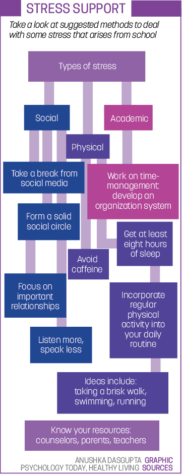The crimson letter proudly declared itself at the top of the page: A-. I looked beneath my score and smiled when I saw the scratch-and-sniff sticker featuring a smiling snail and the words “Nice Work!” underneath. Seeing my hard work pay off gave me a sense of satisfaction. Until, that is, I saw her paper. My once formidable A- fell flat in the face of my classmate’s perfect A.
But my paper didn’t change at all, only my sense of accomplishment. Had I not seen her paper, my contentment would still be intact.
No two people are exactly the same. Inevitably, some people will be smarter, stronger or better-looking than others, and that’s okay. When it comes to our natural talents, we have no control over what we’re given; what we can control is how we choose to use those abilities and react to obstacles.
During this time of year especially, I’ve noticed comparison rearing its ugly head throughout the college application process. In addition to comparing test scores, essays and college choices with other students, students frequent websites touting college acceptance rates statistics, admissions calculators and the Naviance Scattergrams. Although these websites do offer useful information, students often overanalyze the data they provide.

In terms of gaining a general feel for the academic makeup of a university, these tools are excellent. However, students should not obsess over whether or not their scores are “good enough” for a certain school or what their “percent chance of acceptance” is. Each student’s application is different. Although colleges use standardized test scores, GPA and other academic statistics to determine admissions, there are many other qualities colleges consider that can’t be measured with a number: personal essays, extracurricular activities and volunteer work, to name a few. So when students measure themselves against others using academic data points, they paint an incomplete picture of what college admissions officers will evaluate and, therefore, an inaccurate estimate of their chances of acceptance to the college.
So the next time you find yourself stacking up your strengths next to someone else’s, stop. Not only is that an unfair comparison, it’s also unproductive. If you truly wish to improve yourself, spend time honing your skills instead of bemoaning the abilities you lack. With that kind of go-getter attitude, you will be able to achieve meaningful goals rather than end up stuck in a never-ending rat race with your peers.































![What happened to theater etiquette? [opinion]](https://hilite.org/wp-content/uploads/2025/04/Entertainment-Perspective-Cover-1200x471.jpg)














































![Review: “The Immortal Soul Salvage Yard:” A criminally underrated poetry collection [MUSE]](https://hilite.org/wp-content/uploads/2025/03/71cju6TvqmL._AC_UF10001000_QL80_.jpg)
![Review: "Dog Man" is Unapologetically Chaotic [MUSE]](https://hilite.org/wp-content/uploads/2025/03/dogman-1200x700.jpg)
![Review: "Ne Zha 2": The WeChat family reunion I didn’t know I needed [MUSE]](https://hilite.org/wp-content/uploads/2025/03/unnamed-4.png)
![Review in Print: Maripaz Villar brings a delightfully unique style to the world of WEBTOON [MUSE]](https://hilite.org/wp-content/uploads/2023/12/maripazcover-1200x960.jpg)
![Review: “The Sword of Kaigen” is a masterpiece [MUSE]](https://hilite.org/wp-content/uploads/2023/11/Screenshot-2023-11-26-201051.png)
![Review: Gateron Oil Kings, great linear switches, okay price [MUSE]](https://hilite.org/wp-content/uploads/2023/11/Screenshot-2023-11-26-200553.png)
![Review: “A Haunting in Venice” is a significant improvement from other Agatha Christie adaptations [MUSE]](https://hilite.org/wp-content/uploads/2023/11/e7ee2938a6d422669771bce6d8088521.jpg)
![Review: A Thanksgiving story from elementary school, still just as interesting [MUSE]](https://hilite.org/wp-content/uploads/2023/11/Screenshot-2023-11-26-195514-987x1200.png)
![Review: "When I Fly Towards You", cute, uplifting youth drama [MUSE]](https://hilite.org/wp-content/uploads/2023/09/When-I-Fly-Towards-You-Chinese-drama.png)
![Postcards from Muse: Hawaii Travel Diary [MUSE]](https://hilite.org/wp-content/uploads/2023/09/My-project-1-1200x1200.jpg)
![Review: "Ladybug & Cat Noir: The Movie," departure from original show [MUSE]](https://hilite.org/wp-content/uploads/2023/09/Ladybug__Cat_Noir_-_The_Movie_poster.jpg)
![Review in Print: "Hidden Love" is the cute, uplifting drama everyone needs [MUSE]](https://hilite.org/wp-content/uploads/2023/09/hiddenlovecover-e1693597208225-1030x1200.png)
![Review in Print: "Heartstopper" is the heartwarming queer romance we all need [MUSE]](https://hilite.org/wp-content/uploads/2023/08/museheartstoppercover-1200x654.png)



